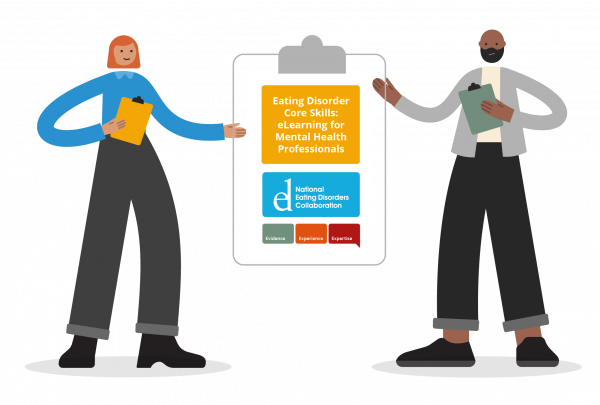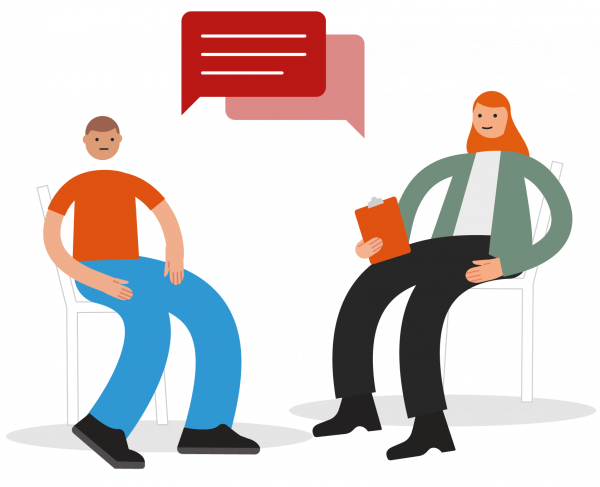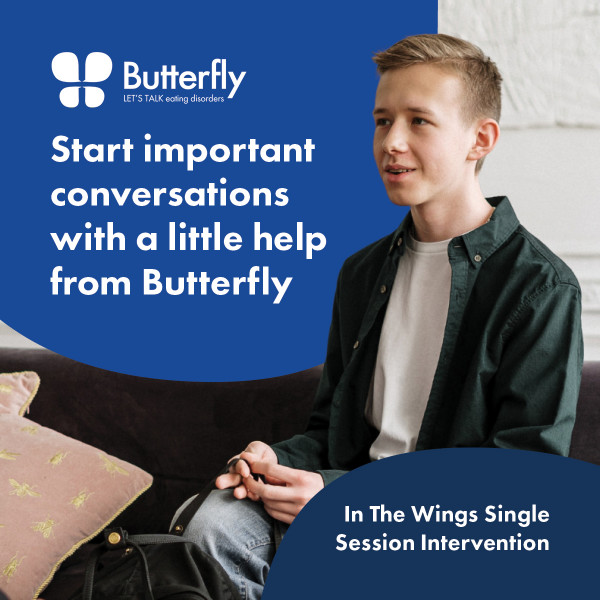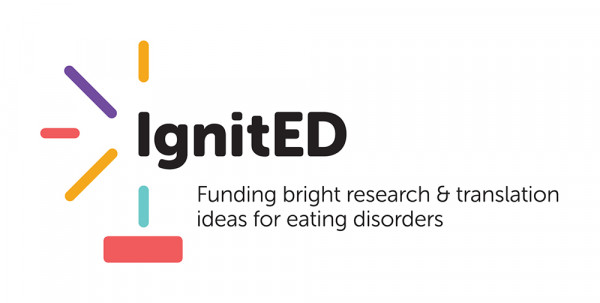Issue 81: Training and Innovation
New: Eating Disorder Core Skills: eLearning for Mental Health Professionals
Q&A with Dr Annaleise Robertson
Training Approvals – Interview with Dr Amanda Bolton and Dr Sarah Egan
Editor’s note
One of NEDC’s main objectives is to help build a skilled and competent national workforce that can provide safe and effective care and treatment for people experiencing an eating disorder, across diagnostic presentations and treatment settings. We are working towards this in several ways and also want to share innovations from other eating disorder organisations which provide opportunities to learn and grow.
NEDC are excited to launch our newest online training Eating Disorder Core Skills: eLearning for Mental Health Professionals. The evidence-based, nationally recognised, and freely accessible training will equip mental health professionals with the knowledge and skills to identify when a person is experiencing an eating disorder, complete a comprehensive eating disorder assessment, refer to appropriate services in the stepped system of care, and understand the components of eating disorder treatment and recovery.
The training is accredited, endorsed, or approved by the Australian Psychological Society (APS), Australian Counselling Association (ACA), Australian Association of Psychologists Inc (AAPi), Australian College of Mental Health Nurses (ACMHN), and Psychotherapy and Counselling Federation of Australia (PACFA), and meets requirements for the ANZAED Eating Disorder Credential for an Introduction to Eating Disorders for Health Professionals training. Read about how you can access it here.
Clinical psychologist and supervisor Dr Annaleise Robertson worked for 12 months with NEDC to develop Eating Disorder Core Skills: eLearning for Mental Health Professionals, the second in our Core Skills series.
“It is full of rich, but simple and accessible resources that mental health professionals can return to as needed, including lots of options to reach out for further professional support, which is especially important given effective treatment requires a multidisciplinary approach. I hope this training also acts as a warm welcome into the huge network of passionate and dedicated professionals who share the same goals within our field,” she said.
“One of the most important messages is that even for those mental health professionals who do not work in this field, they can play an absolutely crucial role in the initial phase of identifying and responding to help someone access appropriate and timely care, regardless of their setting. The impact that can have on someone’s life cannot be overestimated.” Read our Q&A here.
NEDC commenced a Training Approvals process in January for trainings relevant to the ANZAED Eating Disorder Credential. These trainings include introduction to eating disorders for health professionals, evidence-based treatment models, and evidence-informed dietetic practice. From next month (1 July 2022), all clinicians applying for the Credential will need to have completed approved training in order to be awarded the Credential. The National Framework for Eating Disorders Training provides the basis upon which training will be approved, with its purpose being to ensure consistency and quality across the trainings required for the Credential.
A surge in referrals during Melbourne’s lockdowns and the recognition of the need to upskill clinicians in the essentials of eating disorder treatment led Eating Disorders Training Australia’s Dr Sarah Egan and Dr Amanda Bolton to apply, and their combined introductory and CBT-E training was the first training to be approved in January. Read about their experience here.
In the wake of long wait lists for clinical services across Australia, exacerbated by COVID, Butterfly has launched In The Wings: Single Session Intervention (SSI). The free service, developed in collaboration with Dr Anthea Fursland and Dr Susan Byrne of The Centre for Clinical Interventions (CCI) in WA, provides evidence-based assessment and psychoeducation for people waitlisted for eating disorder treatment under an Eating Disorders Treatment Plan (EDTP) or Mental Health Care Plan (MHCP). Read about it here.
The newly established Australian Eating Disorders Research & Translation Centre (AEDRTC) has IgnitED Fund grants of up to $25,000 to develop the testing of innovative scientific solutions that have the potential to positively impact the health and social and emotional wellbeing of people with eating disorders and/or their loved ones. Applications close soon. Find out more here.
Learn about Upcoming Training and Events taking place in June, July and August here.
The NEDC is about collaboration and connection. Please share this eBulletin with colleagues and friends. Your input and your voice matter to us. Contact us at info@nedc.com.au
You can also participate through membership to the NEDC – join us here.
New: Eating Disorder Core Skills: eLearning for Mental Health Professionals
Help spread the news about our newest online training, Eating Disorder Core Skills: eLearning for Mental Health Professionals. The five-hour, self-paced and interactive online training includes practical real-life scenarios and activities, videos from leaders in the field and people with a lived experience of an eating disorder, up-to-date resources, and a formal assessment.
While the training has been developed specifically for Australian mental health professionals, it is also applicable to other medical and health professionals, who can adapt and apply learnings from the training to their context.
Eating Disorder Core Skills: eLearning for Mental Health Professionals builds on our Core Skills series, the first of which was Eating Disorder Core Skills: eLearning for GPs, developed for GPs and accessible here.
There are five modules, which align with the NEDC Workforce Core Competencies and National Framework for Eating Disorders Training, the ANZAED clinical practice and training standards, and the stepped system of care for eating disorders.
Please share this training with health professionals or people with an interest in eating disorders.
For more information or to access the training, click here.
Q&A with Dr Annaleise Robertson
Clinical psychologist and supervisor Dr Annaleise Robertson collaborated with NEDC to develop our newest online training modules, Eating Disorder Core Skills: eLearning for Mental Health Professionals. We spoke to her about her work at the Children’s Hospital at Westmead and the Maudsley Centre for Child and Adolescent Eating Disorders in London, and her hopes of the inclusive as well as educational role that MH Core Skills could perform in the eating disorders sector.
You have training in media and communications as well as psychology. How did you become involved in the eating disorders field?
I was really drawn to the idea of working systemically with young people and their families. I initially became involved in the field through the encouragement of a friend who was already working at the Eating Disorders service at the Children’s Hospital at Westmead. I was fortunate enough to start my role with a week-long training session about multi-family therapy with Ivan Eisler (from Maudsley/Kings College, UK) and my new colleagues.
Tell us about your role in the development of Eating Disorder Core Skills: eLearning for Mental Health Professionals.
My role was really to reflect on how what I’ve learnt during my clinical work, supervision and training over the past 12 years could be incorporated into the Core Skills eLearning modules. For me, a key aspect of this was highlighting the importance of not only knowing the most helpful ways to respond or access appropriate evidence informed care, but allowing for a collaborative, respectful approach that can be individually tailored for each individual or family requiring support. Thinking carefully about respectful language and incorporating the perspective of those with lived experience became a very important part of this process.
What can mental health professionals learn from Eating Disorder Core Skills: eLearning for Mental Health Professionals? What elements do you hope people will take with them into their workplaces on completion of the training?
I hope that the mental health professionals who complete this introductory course will not only take away some key knowledge, skills and confidence about how to initially identify and respond to someone who may be experiencing an eating disorder, but ideally they will also leave with an interest to learn more and perhaps complete further training in providing treatment. It is full of rich, but simple and accessible resources that mental health professionals can return to as needed, including lots of options to reach out for further professional support, which is especially important given effective treatment requires a multidisciplinary approach. I hope this training also acts as a warm welcome into the huge network of passionate and dedicated professionals who share the same goals within our field.
One of the most important messages is that even for those mental health professionals who do not work in this field, they can play an absolutely crucial role in the initial phase of identifying and responding to help someone access appropriate and timely care, regardless of their setting. The impact that can have on someone’s life cannot be overestimated.
How can Eating Disorder Core Skills: eLearning for Mental Health Professionals help improve the system of care and benefit people with lived experience of an eating disorder, and their families and supports?
This training can help mental health professionals from all different disciplines within the system of care develop a shared understanding of the best way to identify and respond to someone who may be experiencing an eating disorder. This ultimately means people will be able to access the support they need quickly, which we know is so important for treatment outcomes.
I also hope through their collaboration that people with lived experience and their families and supports feel heard, respected and like they are safe to ask for and/or accept the help they need (particularly when people feel like they do not need or want this help at the time).
I would also love to see a continued tackling of stigma about eating disorders (or for that matter needing professional support for any mental health difficulty or just the challenges that come up across a typical lifespan for all of us), and for people accessing treatment to know they are not defined solely by their eating disorder and there is a skilled and supportive network growing stronger and making new developments all the time out there waiting to help.
You worked at the Maudsley Centre for Child and Adolescent Eating Disorders in London, where Family-Based Therapy (FBT) was developed. Tell us about your role and experience providing family therapy for eating disorders.
I really loved working at the Maudsley Centre for Child and Adolescent Eating Disorders (or MCCAED), where I worked with young people and their families doing Family Therapy for Anorexia Nervosa (FT-AN) or Bulimia Nervosa (FT-BN) and Enhanced Cognitive Behavioural Therapy for eating disorders (CBT-E). I was also lucky to get to help with one multi-family therapy group in person before the pandemic hit and given the high risk over there at the time, MCCAED did an amazing job of shifting to becoming a largely online service despite a huge increase in referrals (I know services later faced the same challenges here in Australia). Being part of that team and able to stay connected with and continue to see meaningful changes and improvements in people’s lives at such a strange and potentially isolating time was an incredible privilege I will always be so grateful for.
Your article ‘Challenging rigidity in Anorexia (treatment, training and supervision): questioning manual adherence in the face of complexity (2021) states: “One study of 40 therapists delivering FBT to young people with AN found not one therapist delivered a therapy that was consistently adherent to the FBT manual.” You also noted that as full recovery rates at end of FBT are “between 22 and 49%, with dropout rates of up to 20%, the need to continue developing appropriate adaptations to existing manuals is something which the authors of manuals themselves, as well as the field more generally, acknowledge and promote.” What adaptations do you think could help improve FBT recovery rates?
While in that article Chris Thornton (Redleaf Practice) and I do acknowledge the numerous benefits to treatment manuals (and there are a lot!), there’s also some really interesting research and clinical work being done to adapt or enhance family-based treatment (FBT) or family therapy more generally. Recent research has identified the need to adapt treatment to better work for various populations, including young people or their families who identify as neurodiverse, such as those diagnosed with Autism Spectrum Disorder, young people engaging in self-harm, or those who identify as gender diverse or experience gender dysphoria.
Adaptation is also crucial in working in a trauma-informed manner, where issues such as attachment and interpersonal style, self-concept and capacity for mentalisation are all important considerations. Regardless of what treatment you’re providing, it does seem working flexibly and collaboratively with the person experiencing the eating disorder and their family/supports and prioritising the therapeutic relationship (or working alliance) is a crucial part of evidence-based practice.
At the ANZAED Autumn Workshop series you co-presented with Jeremy Freeman on ‘Exploring the value of psychodynamic theory and practice within eating disorders treatment’. How can psychodynamic theory be incorporated into clinical practice for eating disorders?
It’s hard to sum up in a short answer here, but I would definitely say there is a wealth of knowledge within psychodynamic theory that can help us to understand the development and maintenance of eating disorders, as well as some of the more deep, difficult to articulate ways in which the emotional connection offered through therapy (regardless of which treatment model you use) can not only help people to recover, but go on to live happy, healthy and fulfilled lives.
There’s also an increasing amount of evidence to support its usefulness and validity as a treatment, which is great given it actually has such a long history of contributing to the field. Can I please give a plug for ANZAED’s Psychodynamic Special Interest Group (SIG) here? We have newsletters, specialised webinars and are currently planning some reading groups as just a few benefits – so come join us!
What would you like to see in the future of eating disorder treatment in Australia?
This question is exciting because it fills me with hope and possibility. I would like to see continued efforts to enhance access to education and training, and an ongoing openness to come together from all the different professionals who make up our fantastic multidisciplinary field. It’s a real privilege to be part of this wonderful passionate group as we constantly strive to improve outcomes and experiences for people with an eating disorder and their family/supports. It’s also a privilege to have the contributions of so many people with lived experience enhancing all areas of our field, including developments in treatment, research, training and policy.
I suppose the challenge is always to continue to build on all that has been achieved so far while remaining open to change, new information and ways of doing things, with the ultimate goal of improving treatment access and outcomes within Australia and also contributing to the field internationally. And we’re doing it!
Access Eating Disorder Core Skills: eLearning for Mental Health Professionals here.
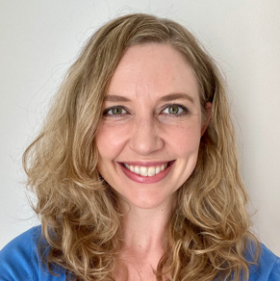
Dr Annaleise Robertson (she/her) is a clinical psychologist and supervisor who specialises in systemic and psychodynamic frameworks for working with young people experiencing eating disorders, their families, and the professionals that support them. Annaleise has worked at the Children’s Hospital at Westmead since 2012, with extensive experience in evidence-informed inpatient, outpatient and group therapy. She has recently returned from two years living in London where she worked at the Maudsley Centre for Child and Adolescent Eating Disorders and undertook further psychodynamic training at the Tavistock and Portman Institute. Annaleise provides regular education, training and supervision in eating disorders, including presenting conference workshops in Sydney, Melbourne, Prague, London and New York. Annaleise currently provides consultation with the National Eating Disorders Collaboration (NEDC), the Australia and New Zealand Academy for Eating Disorders (ANZAED) as a group supervisor and is co-chair of the ANZAED Psychodynamic Special Interest Group. She also supervises the Family Therapy clinic at the University of Sydney and lectures for postgraduate and undergraduate courses.
She is passionate about valuing diversity and understanding the unique perspectives of people who are experiencing or have experienced an eating disorder, their families, and the professionals and teams who support them, finding a way to prioritise individual needs and preferences alongside evidence-informed practice.
Training Approvals – Interview with Dr Amanda Bolton and Dr Sarah Egan
Eating Disorders Training Australia’s Dr Sarah Egan and Dr Amanda Bolton co-present ‘Assessment and treatment of adolescents and adults with eating disorders in private practice: A comprehensive introductory 3-day workshop (Intro + CBT-E)’. Their training received approval from NEDC and met the requirement for a combined introduction to eating disorders and evidence-based treatment model training under the ANZAED Eating Disorder Credential eligibility criteria. We spoke to Sarah and Amanda about the process involved in gaining approval for their training. You can access NEDC’s Training Approvals here.
Tell us about the training you offer and your experience of successfully completing the approvals process.
We offer a national, live, and interactive combined training – 1-day introduction of eating disorders and a 2-day treatment model training (CBT-E). Day 1 of our training covers all of the essential information a clinician needs to know when starting to work in eating disorders including diagnostic information, warning signs, risk factors, medical risks, working within care teams in private practice, and navigating Medicare to name a few. Days 2 and 3 focus on CBT-E as a treatment model with the integration of family work and additional therapeutic strategies that complement the CBT-E model (e.g., self-compassion, DBT skills, and specific body image skills).
Clinicians can go on to work with older adolescent and adult clients with a range of eating disorders following the training. We also offer group supervision after the training for anyone who would like to consolidate their skills, a range of resources to draw on, and a Facebook group where clinicians can maintain connections and support each other and ask questions as they develop their skills. All of our training was designed to be delivered online, so clinicians can learn from home with clinicians from all over Australia (and occasionally NZ). We consider our training to be a ‘one-stop shop’, covering all of the essentials a clinician will need to start doing this work and do so confidently.
We feel very grateful and privileged to have been one of the first training providers to have our training approved. The process was smooth and straightforward. We have been so fortunate to work with some incredible clinicians and are so thankful for all of their support, including that we received from the NEDC during the approvals process. They have been available and supportive, making this process so much easier.
How did the National Framework for Eating Disorders Training – A guide for training providers and the defined General Standards and Content Standards guide your training design, content, and implementation?
We set out to do this during the peak of COVID-19 and associated lockdowns in Melbourne. We noticed the surge in referrals that we were receiving in our respective practices, but also heard from our dedicated colleagues about the increase in demand and increase in ED presentations. We were focused on finding a way to upskill clinicians to be able to do this work confidently, with a focus on the information and skills they really need to know – the essentials.
The guides and standards were around at this time and it made sense to us to use a framework such as those standards to guide some of what we cover in the training. We aligned our training from the beginning with these guides and standards in mind, and kept a document outlining how we met each standard as we developed the program from the beginning. It was helpful in narrowing the focus and having a structure from which we could then expand and add our own knowledge and experience.
The Framework states that; “Treatment of eating disorders requires specific knowledge and skills that are currently outside the scope of foundational allied health or medical training”. How can the Training Approvals process address this?
The training approvals process addresses this by ensuring that all providers are clear on the competencies all clinicians must meet during the training, and specifics of how to meet each competency, to facilitate the delivery of evidence-based information that has consistent key features.
This helps create a workforce that as a minimum has the same base level of knowledge and skills – it makes the process much more streamlined. This is especially important in eating disorder work. Clinicians and clients can feel confident that the training clinicians receive will allow them to deliver the best care possible and the type of treatment they need and deserve.
How do you see the Training Approvals process as contributing to building a skilled and competent workforce of clinicians who are able to provide safe and effective treatment for people experiencing an eating disorder?
The training approvals process is straightforward. It can be a little lengthy in that there is a lot to cover and information to provide, but we believe this is necessary to ensure trainings are consistently meeting the required standards. However, in saying that, having designed and put together our training, the accreditation process was very do-able as we were very familiar with all of the content and could easily provide evidence/information as meeting the standards. It was also helpful that our training was aligned with the standards from its inception.
We believe the training approvals is necessary and crucial in providing training that meets the standards and the needs of clinicians starting to do this work. It an important part of building a skilled and competent workforce. Over the years, we have certainly seen the impact on clients and their families when accessing safe and effective treatment has taken too long or where treatment has been accessed but hasn’t been effective. This is a very important step in the process of instilling hope and confidence in clients and their families that they can find clinicians who are skilled and will provide treatment that is safe and effective.
What steps would you recommend for other treatment providers interested in gaining Training Approval?
We found it helpful to consult the practice guidelines and understand specifically what requirements any training may have – that is, what information is absolutely essential to teach and know before commencing work in this area. We found it helpful to keep in touch with representatives from NEDC during the process to clarify information and ensure we were interpreting the guidelines correctly.
For us it was also very important to ensure that client lived experience was front and centre, so having this as part of your thinking/planning is helpful. Be clear about what your learning outcomes are and what the purpose/aim of your training may be. Then spend the time to go through and ensure that your training fits with all of the requirements – it makes the process of applying and completing the paperwork so much easier!
Find out how you can apply for NEDC Training Approval here.

Dr Sarah Egan is a senior clinical psychologist, trainer and board approved clinical supervisor with extensive experience working across the lifespan with clients and their loved ones with eating disorders. Sarah works within a developmental frame and has trained to hold systems in mind while working with the individual and or their supports. She has worked in both private practice and public mental health for 10+ years, including in Early in Life Mental Health Service, Adult Mental Health Services, and the Butterfly Day Program. She is the owner of a private practice, Breeze Psychology, and co-owner of Eating Disorders Training Australia.
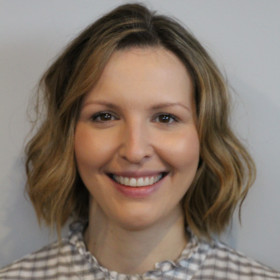
Dr Amanda Bolton is a senior clinical psychologist with many years of experience working with adolescents and their families as well as adults recovering from an eating disorder in both public and private settings. Amanda is the owner of her own private practice Inner Sanctuary Psychology and co-owner of Eating Disorders Training Australia. Amanda spent many years working at the Butterfly Eating Disorder Day program as both a clinician and as the senior clinician coordinator of the program. She has worked at Monash Health child and adolescent services and outpatient adult services. Amanda is also a board approved supervisor.
Butterfly launches In the Wings: Single Session Intervention
In response to overwhelming demand for eating disorder treatment in the COVID era, the Butterfly Foundation has launched an innovative new service, In The Wings: Single Session Intervention (SSI), for people currently on a waitlist under an Eating Disorders Treatment Plan (EDTP) or Mental Health Care Plan (MHCP).
“Healthcare professionals working with people with eating disorders are well aware of the significant demand we’re seeing for our services,” said Ranjani Utpala, Butterfly Clinical Services Director.
“There is emerging evidence to suggest that people can experience symptom improvement if they receive support and information while they await treatment. By offering an SSI in the early stages of referral, we can ensure that
i) people are on the correct waiting list,
ii) receive psychoeducation and resources to keep them engaged, and
iii) provide hope and motivation to make small changes while they wait for an appointment.”
In The Wings, a piloted service available until 30 June 22, will offer referred participants who are waitlisted for eating disorder treatment under an EDTP or MHCP:
- a free 60-to-90-minute online session with psychologists trained by Drs Anthea Fursland PhD, FAED and Susan Byrne PhD, DPhil (who developed SSI)
- psychoeducation about the physical and psychosocial consequences of eating disorders
- a provisional diagnosis
- an understanding of the factors that are maintaining their eating disorder
- a range of psychoeducational resources
- a plan to work with while people wait to be offered ongoing treatment.
For more information on the requirements for participants during the pilot phase, or to refer a participant please go to butterfly.org.au/get-support/inthewings/
AEDRTC IngnitED Fund grants available
Apply now for the Australian Eating Disorders Research & Translation Centre (AEDRTC) IgnitED Fund grants of up to $25,000 to develop the testing of innovative scientific solutions that have the potential to positively impact the health and social and emotional wellbeing of people with eating disorders and/or their loved ones.
“IgnitED is focused on the co-design phase of research: developing an idea with the people it affects as part of a team with a researcher and a lived experience expert, and a clinician or relevant community member,” said Associate Professor Sarah Maguire, Director of the InsideOut Institute for Eating Disorders and AEDRTC.
“We hope that IgnitED will be the starting point for new and important scientific work that drives better treatments, supports and outcomes for people living with an eating disorder, their families and carers.”
People with lived experience expertise and Aboriginal and/or Torres Strait Islander peoples are strongly encouraged to submit an application.
The grants are open to anyone living in Australia. Applications closing soon Wednesday 15 June 2022.
Click here to apply: eatingdisordersresearch.org.au/ignited
Upcoming training and events
JUNE:
- Training: Western Australia Eating Disorders Outreach and Consultation Service (WAEDOCS) - Eating Disorder Essentials for Dietitians
- Webinar: Eating Disorders Families Australia (EDFA) - Parenting and Setting Boundaries around an Eating Disorder
- Training: Butterfly Body Esteem Educator
JULY:
- Training: The Centre for Eating, Weight and Body Image - Guided Self-Help CBT for Eating Disorders, Family Based Therapy for Adolescents with Anorexia Nervosa, and Dialectical Behavioural Therapy (DBT) for Eating Disorders: The Who, How & Why
- Webinars: Eating Disorders Families Australia (EDFA) - Answers to Anorexia – Malnourished Minds and Nutritional Management for Eating Disorders
AUGUST:
- Webinar: Eating Disorders Families Australia (EDFA) - Highlighting Programs for Eating Disorders in Australia using the TBT-S Model
- Conference: Australia & New Zealand Academy for Eating Disorders 2022 Annual Conference, Sydney and online
- Training: The Centre for Eating, Weight and Body Image - Interpersonal Psychotherapy (IPT) for Eating Disorders
- Training: Western Australia Eating Disorders Outreach and Consultation Service (WAEDOCS) - Understanding the Principles & Applications of CBT-E & FBT for Dietitians Including the Foundations of Outpatient Paediatric Management (<16 years)
The Academy for Eating Disorders Virtual ICED 2022: Embracing Change and Extending Reach in a Transformed World is taking place June 9-10. To see Australian contributions click here.
Click here to access these and other upcoming events.
Click here to submit your own event.
« Back to Browse Resources



